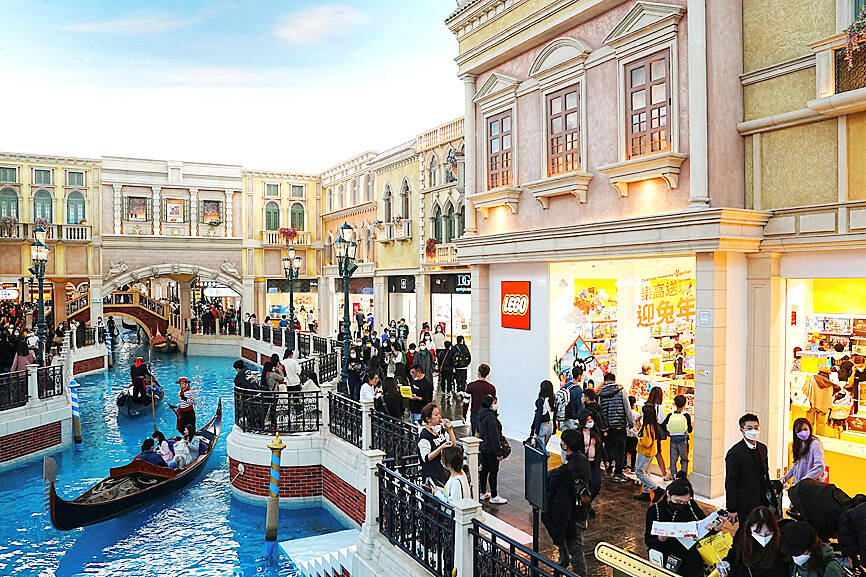Macau casinos have been forced to remove thousands of hotel rooms from booking systems and cut back on guest services such as housekeeping, as a labor shortage leaves the gambling hub struggling to cater to a surge of tourists from China.
Some five-star hotels in Macau’s casinos only have fewer than half of their rooms available for booking, people familiar with the situation said.
Another operator has about 20 percent of its rooms out of commission, Macau Responsible Gaming Association president Billy Song (宋偉傑) said.

Photo: Reuters
The lack of service staff is so severe that some hotels have reduced the frequency of maid services, who clean rooms only after customers check out, he said.
While casino operators hope their hotels can reach near capacity by the summer, Macau’s slow hiring process for foreign workers is a major hurdle to fully reopening now that COVID-19 border curbs and restrictions have ended, Song said.
“We didn’t expect the reopening would come so fast, so everybody’s struck unprepared,” Song said in an interview.
“After three dismal years, we all want to make the best out of this year, but now that customers have come, we don’t have enough capacity to receive them,” he said.
Capturing an initial wave of tourists is crucial for Macau’s recovery after ceding its crown as the world’s largest gambling hub to Las Vegas during the COVID-19 pandemic as China shuttered its borders.
The labor shortage is triggering room-rate inflation and a drop in the quality of hospitality, both of which could deter visitors.
It could also further strain casino operators, which saw a combined loss of US$1.6 billion during the pandemic. A crackdown on high-rollers and their agents has already scuppered Macau’s VIP industry, which contributed half of the city’s gambling revenue before COVID-19.
Casinos are also facing tighter government control after an overhaul of local gaming laws gave authorities increased oversight of their operations, including overall performance and major financial decisions.
Most Macau casino jobs — including dealers, floor managers and accountants — are reserved for locals.
The most urgent workforce needs are service staff such as waiters, cleaners and receptionists at hotels and restaurants, Song said.
Those jobs were largely shunned by locals and filled by foreign workers before the pandemic — many of them from mainland China and Southeast Asia, he said.
More than 44,000 non-local employees have left Macau since early 2020, leaving a gaping hole in the workforce as China’s end of its “zero COVID” policy has fueled a travel boom not seen since 2019.
The gaming hub relies on the mainland and Hong Kong for more than 90 percent of its visitors.
At the same time, hotel prices are quickly rising. In February, Macau’s average hotel room price was about US$150 — already 80 percent of its pre-COVID level — while visitation was only 45 percent of what it was in 2019, Macau Government Tourism Office data showed.

Sweeping policy changes under US Secretary of Health and Human Services Robert F. Kennedy Jr are having a chilling effect on vaccine makers as anti-vaccine rhetoric has turned into concrete changes in inoculation schedules and recommendations, investors and executives said. The administration of US President Donald Trump has in the past year upended vaccine recommendations, with the country last month ending its longstanding guidance that all children receive inoculations against flu, hepatitis A and other diseases. The unprecedented changes have led to diminished vaccine usage, hurt the investment case for some biotechs, and created a drag that would likely dent revenues and

Macronix International Co (旺宏), the world’s biggest NOR flash memory supplier, yesterday said it would spend NT$22 billion (US$699.1 million) on capacity expansion this year to increase its production of mid-to-low-density memory chips as the world’s major memorychip suppliers are phasing out the market. The company said its planned capital expenditures are about 11 times higher than the NT$1.8 billion it spent on new facilities and equipment last year. A majority of this year’s outlay would be allocated to step up capacity of multi-level cell (MLC) NAND flash memory chips, which are used in embedded multimedia cards (eMMC), a managed

CULPRITS: Factors that affected the slip included falling global crude oil prices, wait-and-see consumer attitudes due to US tariffs and a different Lunar New Year holiday schedule Taiwan’s retail sales ended a nine-year growth streak last year, slipping 0.2 percent from a year earlier as uncertainty over US tariff policies affected demand for durable goods, data released on Friday by the Ministry of Economic Affairs showed. Last year’s retail sales totaled NT$4.84 trillion (US$153.27 billion), down about NT$9.5 billion, or 0.2 percent, from 2024. Despite the decline, the figure was still the second-highest annual sales total on record. Ministry statistics department deputy head Chen Yu-fang (陳玉芳) said sales of cars, motorcycles and related products, which accounted for 17.4 percent of total retail rales last year, fell NT$68.1 billion, or

In the wake of strong global demand for AI applications, Taiwan’s export-oriented economy accelerated with the composite index of economic indicators flashing the first “red” light in December for one year, indicating the economy is in booming mode, the National Development Council (NDC) said yesterday. Moreover, the index of leading indicators, which gauges the potential state of the economy over the next six months, also moved higher in December amid growing optimism over the outlook, the NDC said. In December, the index of economic indicators rose one point from a month earlier to 38, at the lower end of the “red” light.